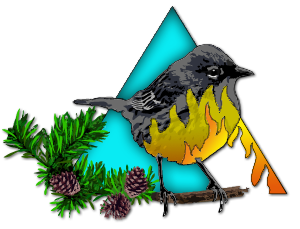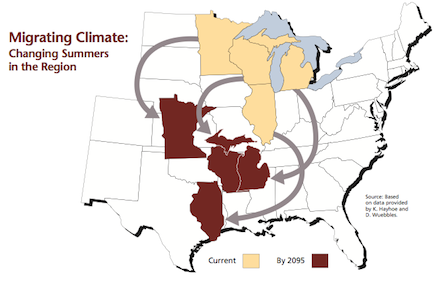Navigation

Upcoming Events
There are no events planned.
Webinar Archive
Climate change and forest ecosystem vulnerability in the Lake States: how to account for wildfire?
Stephen Handler
Climate Change Specialist
Northern Institute of Applied Climate Science
Webinar presented Tuesday, November 20th, 2012.
Click to view the recorded YouTube webinar.
Stephen Handler from the Northern Institute of Applied Climate Science (Houghton, MI) introduced a regional effort to incorporate climate change considerations into forest management and planning, the Climate Change Response Framework (www.climateframework.org). Part of this effort involves preparing climate change vulnerability assessments on forest ecosystems for specific regions across the eastern US. These assessments incorporate downscaled climate projections, ecosystem model simulations, and manager input. Future wildfire conditions have been one of the trickiest factors to consider: How might climate change influence wildfire frequency, severity, or extent? How might the fire season shift under future conditions? How might these changes interact with changes in forest vegetation? This webinar was a discussion focused on gathering ideas from the community of fire professionals in the Lake States.
Read more about Mr. Handler's work with fire and climate change and the Northern Institute of Applied Climate Science.
References from the webinar:
Websites:
Climate Change Response Framework: www.climateframework.org
Climate Change Resource Center: http://www.fs.fed.us/ccrc/
USGS Geodata Portal: http://cida.usgs.gov/climate/gdp/ (downscaled climate data)
U of Toronto Fire Lab publications: http://www.firelab.utoronto.ca/people/mdf_pubs.html
Climate Chang Tree Atlas: http://www.nrs.fs.fed.us/atlas/
ClimateWizard: www.climatewizard.org
Publications:
Vulnerability Assessment for northern WI: www.nrs.fs.fed.us/pubs/38255
Forest Adaptation Resources document: www.nrs.fs.fed.us/pubs/40543
Moritz et al. 2012: Climate change and disruptions to global fire activity. Ecosphere. 6:6.
http://www.esajournals.org/doi/pdf/10.1890/ES11-00345.1
Miranda et al. 2012: Spatial and temporal drivers of wildfire occurrence in the context of rural development in northern Wisconsin, USA. International Journal of Wildland Fire. 21: 2 http://www.publish.csiro.au/?paper=WF10133
Sommers et al. 2011: Fire History and Climate Change. Report Submitted to the Joint Fire Science Program for Project 09-02-1-09
Drever 2009: Effects of climate on occurrence and size of large fires in a northern hardwood landscape: historical trends, forecasts, and implications for climate change in Témiscamingue, Québec. Applied
Vegetation Science. 12:3. http://dx.doi.org/10.1111/j.1654-109X.2009.01035.x
Flannigan et al. 2009: Impacts of climate change on fire activity and fire management in the circumboreal forest. Global Change Biology. 15:3 http://dx.doi.org/10.1111/j.1365-2486.2008.01660.x
Le Goff et al. 2009: Potential changes in monthly fire risk in the eastern Canadian boreal forest under future climate change. Canadian Journal of Forest Research. 39:12. http://dx.doi.org/10.1139/X09-153
Wotton et al. 2010: Forest fire occurrence and climate change in Canada. International Journal of Wildland Fire. 19:3. http://dx.doi.org/10.1071/WF09002
Sinha and Cherkauer 2010: Impacts of future climate change on soil frost in the midwestern United States. Journal of Geophysical Research-Atmospheres. http://www.agu.org/pubs/crossref/2010/2009JD012188.shtml
Cherkauer and Sinha 2010: Hydrologic Impacts of Projected Future Climate Change in the Lake Michigan Region. Journal of Great Lakes Research. http://www.sciencedirect.com/science/article/pii/S0380133009002184
Mishra et al. 2010: Assessment of Drought due to Historic Climate Variability and Projected Future Climate Change in the Midwestern United States. Journal of Hydrometeorology. 11:1. http://journals.ametsoc.org/doi/abs/10.1175/2009JHM1156.1
Additional information about fire and climate change:
Joint Fire Science Program publication "Fire History and Climate Change"
Presenter Contact Information:
Stephen Handler
Climate Change Specialist
Northern Institute of Applied Climate Science
USDA Forest Service
410 MacInnes Dr.
Houghton MI 49931
906.482.6303 x21
www.nrs.fs.fed.us/niacs
email
Test your connection before the webinar:
1. To Test your computer internet connection and compatibility with adobe connect, click here (or paste http://admin.adobeconnect.com/common/help/en/support/meeting_test.htm into your brower ) and follow the prompts. You will need the browser add-in only if you anticipate speaking during the webinar.
2. You will need to use the speaker output from your computer, so make sure you know how to control your speaker volume and attach external speakers for better performance. We will prompt you to type questions in throughout the session.
3. For more information about participating in an adobe connect session, watch this 2 minute video (http://www.adobe.com/go/lrvid_cnn_803_en) or download this document.

.png)

